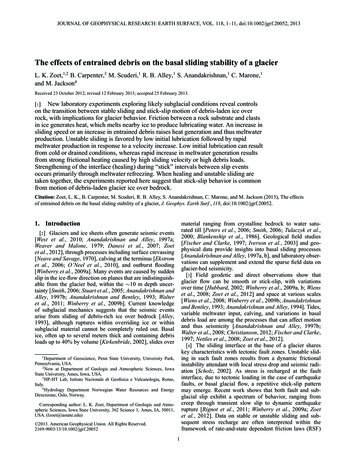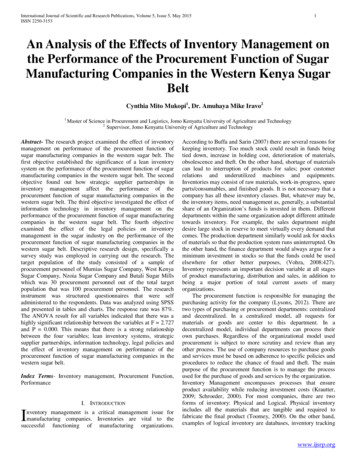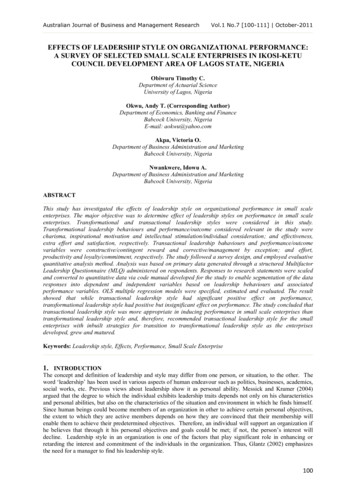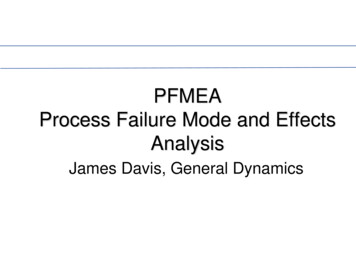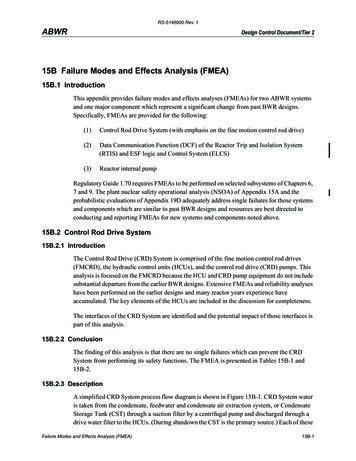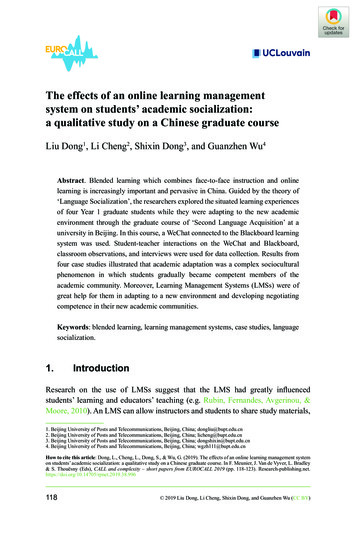
Transcription
The effects of an online learning managementsystem on students’ academic socialization:a qualitative study on a Chinese graduate courseLiu Dong1, Li Cheng2, Shixin Dong3, and Guanzhen Wu4Abstract. Blended learning which combines face-to-face instruction and onlinelearning is increasingly important and pervasive in China. Guided by the theory of‘Language Socialization’, the researchers explored the situated learning experiencesof four Year 1 graduate students while they were adapting to the new academicenvironment through the graduate course of ‘Second Language Acquisition’ at auniversity in Beijing. In this course, a WeChat connected to the Blackboard learningsystem was used. Student-teacher interactions on the WeChat and Blackboard,classroom observations, and interviews were used for data collection. Results fromfour case studies illustrated that academic adaptation was a complex socioculturalphenomenon in which students gradually became competent members of theacademic community. Moreover, Learning Management Systems (LMSs) were ofgreat help for them in adapting to a new environment and developing negotiatingcompetence in their new academic communities.Keywords: blended learning, learning management systems, case studies, languagesocialization.1.IntroductionResearch on the use of LMSs suggest that the LMS had greatly influencedstudents’ learning and educators’ teaching (e.g. Rubin, Fernandes, Avgerinou, &Moore, 2010). An LMS can allow instructors and students to share study materials,1. Beijing University of Posts and Telecommunications, Beijing, China; dongliu@bupt.edu.cn2. Beijing University of Posts and Telecommunications, Beijing, China; licheng@bupt.edu.cn3. Beijing University of Posts and Telecommunications, Beijing, China; dongshixin@bupt.edu.cn4. Beijing University of Posts and Telecommunications, Beijing, China; wgzh111@bupt.edu.cnHow to cite this article: Dong, L., Cheng, L., Dong, S., & Wu, G. (2019). The effects of an online learning management systemon students’ academic socialization: a qualitative study on a Chinese graduate course. In F. Meunier, J. Van de Vyver, L. Bradley& S. Thouësny (Eds), CALL and complexity – short papers from EUROCALL 2019 (pp. 118-123). pnet.2019.38.996118 2019 Liu Dong, Li Cheng, Shixin Dong, and Guanzhen Wu (CC BY)
The effects of an online learning management system.submit and return assignments, and exchange ideas online. Many platforms, likeWeChat and Blackboard, have been useful tools for Chinese students to study andcommunicate in recent years. Studies on these tools suggest that they had a positiveimpact on the students’ learning (Liu, Wang, & Tai, 2016).Early studies on language socialization have investigated how newcomers wouldbe socialized in the community (e.g. Duff, 2010). However, many studies haveignored that the use of technology also has great impact on students’ learning whilethey adapt to a new environment.In this study, we explored the perceived benefits and actual use of an LMS byinstructors and students at a university in Beijing. We did a one year researchto find out how they adapted to the new environment of postgraduate educationwith the help of the LMS. To be more specific, we aim to answer the followingquestions. How do the Year 1 graduate students adapt to the new academicenvironment with the help of LMS? What are the similarities or differences in their academic adaptationexperiences in the course of second language acquisition supported bythe LMS? What are the emerging effects of the LMS on the participants’ adaptationexperiences?2.Method2.1.Contextual background and participantsThe study was conducted in a graduate course of ‘Second Language Acquisition’at a university in China. This course is a compulsory course for graduate studentsto explore major issues in second language acquisition and English teaching.The course aims to help students improve their academic competence and learnacademic English more deeply.We focused on four Chinese participants: Gary, Lee, Andy, and Maria. With thepermission of the instructor and volunteers, one of the researchers observed the119
Liu Dong, Li Cheng, Shixin Dong, and Guanzhen Wuparticipants in order to note their behaviors. The time span was from September2018 to June 2019.2.2.Research designWeChat and Blackboard, which are regarded as learning resource centers, bulletinboards (posted messages or announcements), and chatrooms (exchanged ideas andprovided group discussion), are the most popular learning and teaching tools inChina (Wang, Fang, Han, & Chen, 2016).The researchers conducted a multiple case study for one year. Data were collectedfrom classroom observations, individual interviews, and interactive messagesfrom WeChat and Blackboard (see Table 1). We took note of our observations. Theinterview data were first transcribed by the researchers and then double checked bythe participants and the course instructor.Table 1.Data collectionMethodInterviews withfour participantsClassroomobservationsData collection period(September, 2018-June, 2019)Interview 1: September 2018Interview 2: December 2018Interview 3: June 201916 lessons in the first semesterLMS datacollection3.DataFace-to-face interviewsTotal 12 interviews and 24 hoursAudiotaped32 hours of classroomobservationsObservation notesHandoutsWeChat and Blackboard messagesOnline courseworkResults and discussionPresented in this section are preliminary findings of the one-year study. Duringthe first year of the participants’ graduate studies, they all experienced a complexadaptation process and met different difficulties. The research data revealed twothemes: peer effects and positive aspects of the online learning experience.3.1.Peer effectsAcademic adaptation is a dialogic and communal act that happens duringthe graduate studies (Seloni, 2012), so peer effects were evaluated within120
The effects of an online learning management system.different communities: members in the same academic groups, classmates,and supervisors. Their behaviors may have a positive or negative effect on thestudents (Krasilnikov & Smirnova, 2017). We analyzed the data mainly from theinteractions on WeChat and Blackboard. In this paper, we took Gary and Andyas examples.The main challenge for Gary to adapt to the new academic environment was hisworries about the differences between his previous and present degree. Therefore,he had to ask his supervisor and senior students for help through WeChat so thathe could be familiar with the new environment. Through three interviews, wefound that what his classmates or roommates did may have had a great influenceon him. He repeatedly said that he used these online tools to communicate withfriends, classmates, and supervisors. He gradually began to adapt to the newenvironment. He said,“since WeChat is the main tool for us to communicate, my supervisorsends me tasks about academic papers, writing skills and revisingfeedback in almost every day. Frequent communication comforts meand helps me be familiar with the academic environment ” (interview,20/12/2018).The interaction between students and peers indicates that a tight community willgive individuals more support and help them adjust quickly to new academicenvironments. Andy’s social network was very simple. She always communicatedwith her classmates through the online tools. Andy remarked as below:“My supervisor and senior students care little for me, and I always envyother classmates, because they can get a lot of help from them. The onlyway for me to get help and information is to ask my classmates for help.Sometimes, I feel unhappy” (interview, 22/12/2018).From Andy’s interviews, we found that whether the supervisor and senior studentscan give help has a big influence on her adaptation experiences. It seemed that herattitude toward her social community had affected her performance negatively.3.2.Positive aspects of the online learning experiencePrevious researches have shown that the LMS is a complementary alternative totraditional tools on teaching method. The focal participants all adopted positiveattitudes toward mobile learning. Gary remarked as below:121
Liu Dong, Li Cheng, Shixin Dong, and Guanzhen Wu“I think it’s very useful. It provides an easier and more convenient way tolearn new knowledge. It’s easy to control” (interview, 20/12/2018).In addition, Andy stated,“generally, it’s good. The teacher knows how to use the online toolsmore efficiently. If there are some pictures or files which cannot beprinted on time, or some students sit away from the Blackboard, theteacher will use the mobile phone and send these materials to the WeChatgroups immediately. She will also put some materials on the Blackboardplatform for us to review. However, I think it is essential that teachersshould guide the students to focus on the study materials” (interview,22/12/2019).The focal participants all experienced the traditional teaching style before theywent to the graduate school. The online learning management system was a newattempt for them to adapt to the academic environment. They could get moreacademic information from the WeChat and Blackboard platforms, which helpedthem adapt to the academic environment quickly.4.ConclusionIn conclusion, the online LMS had a positive influence on the students’ adaptationto the new academic environment, and peers played a significant role in theparticipants’ academic socialization. Our results suggest that it is worthwhile toinvestigate the ways of strengthening students’ social networks. Data also showedthat educators should look for the best ways of using the LMS.5.AcknowledgmentsThis research work was supported by two research funds (2018Y019 andBJSZ2019ZC12).ReferencesDuff, P. A. (2010). Language socialization into academic discourse communities. Annual Reviewof Applied Linguistics, 30, 169-192. https://doi.org/10.1017/S0267190510000048122
The effects of an online learning management system.Krasilnikov, A., & Smirnova, A. (2017). Online social adaptation of first-year students and theiracademic performance. Computers & Education, 113, 327-338. https://doi.org/10.1016/j.compedu.2017.05.012Liu, C.-C., Wang, P.-C., & Tai, S.-J. D. (2016). An analysis of student engagement patterns inlanguage learning facilitated by Web 2.0 technologies. ReCALL, 28(2), 104-122. https://doi.org/10.1017/S095834401600001XRubin, B., Fernandes, R., Avgerinou, M. D., & Moore, J. (2010). The effect of learningmanagement systems on student and faculty outcomes. The Internet and Higher Education,13(1-2), 82-83. , L. (2012). Academic literacy socialization of first year doctoral students in US: amicro-ethnographic perspective. English for Specific Purposes, 31(1), 47-59. https://doi.org/10.1016/j.esp.2011.05.004Wang, Y., Fang, W.-C., Han, J., & Chen, N.-S. (2016). Exploring the affordances of WeChat forfacilitating teaching, social and cognitive presence in semi-synchronous language exchange.Australasian Journal of Educational Technology, 32(4), 18-37. https://doi.org/10.14742/ajet.2640123
Published by Research-publishing.net, a not-for-profit associationContact: info@research-publishing.net 2019 by Editors (collective work) 2019 by Authors (individual work)CALL and complexity – short papers from EUROCALL 2019Edited by Fanny Meunier, Julie Van de Vyver, Linda Bradley, and Sylvie ThouësnyPublication date: 2019/12/09Rights: the whole volume is published under the Attribution-NonCommercial-NoDerivatives International (CC BY-NC-ND)licence; individual articles may have a different licence. Under the CC BY-NC-ND licence, the volume is freely availableonline 542) for anybody to read, download, copy, and redistributeprovided that the author(s), editorial team, and publisher are properly cited. Commercial use and derivative works are,however, not permitted.Disclaimer: Research-publishing.net does not take any responsibility for the content of the pages written by the authorsof this book. The authors have recognised that the work described was not published before, or that it was not underconsideration for publication elsewhere. While the information in this book is believed to be true and accurate on the date ofits going to press, neither the editorial team nor the publisher can accept any legal responsibility for any errors or omissions.The publisher makes no warranty, expressed or implied, with respect to the material contained herein. While Researchpublishing.net is committed to publishing works of integrity, the words are the authors’ alone.Trademark notice: product or corporate names may be trademarks or registered trademarks, and are used only foridentification and explanation without intent to infringe.Copyrighted material: every effort has been made by the editorial team to trace copyright holders and to obtain theirpermission for the use of copyrighted material in this book. In the event of errors or omissions, please notify the publisher ofany corrections that will need to be incorporated in future editions of this book.Typeset by Research-publishing.netCover theme by 2019 Frédéric VerollemanCover layout by 2019 Raphaël Savina (raphael@savina.net)Fonts used are licensed under a SIL Open Font LicenseISBN13: 978-2-490057-54-2 (Ebook, PDF, colour)ISBN13: 978-2-490057-55-9 (Ebook, EPUB, colour)ISBN13: 978-2-490057-53-5 (Paperback - Print on demand, black and white)Print on demand technology is a high-quality, innovative and ecological printing method; with which the book is never ‘outof stock’ or ‘out of print’.British Library Cataloguing-in-Publication Data.A cataloguing record for this book is available from the British Library.Legal deposit, France: Bibliothèque Nationale de France - Dépôt légal: décembre 2019.
The effects of an online learning management system on students’ academic socialization: a qualitative study on a Chinese graduate course . environment through the graduate course of ‘Second Language Acquisition’ at a university in Beijing. In this course, a WeChat connected to the Blackboard learn
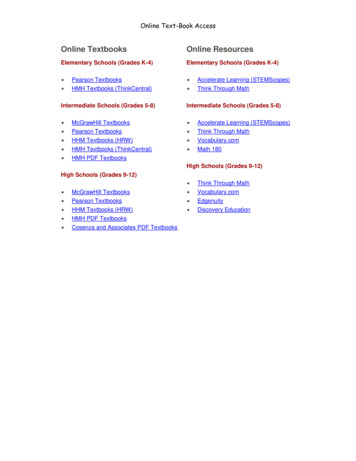

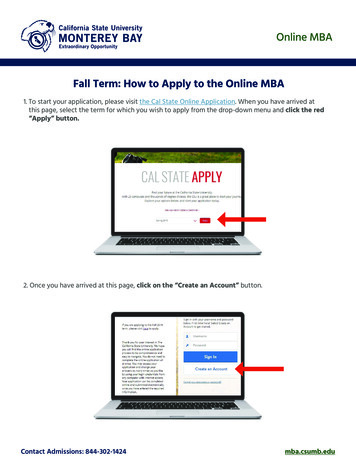

![[digital] Visual Effects and Compositing](/img/1/9780321984388.jpg)
